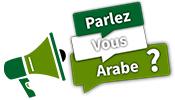La conjugaison des verbes (غَشَّ) et (شَدَّ) en langue arabe
Table des matières
- La conjugaison du verbe (غَشَّ)
- La conjugaison du verbe (شَدَّ)
L’exemple de la conjugaison de deux verbes à racine trilitère en langue arabe

La conjugaison du verbe (غَشَّ) :
Le verbe (غَشَّ) « ghacha » est un verbe trilitère (ثلاثي), régulier (صحيح) avec les deux dernières lettres doubles (مضاعف) et qui signifie : tromper, bluffer, frauder, mystifier, abuser, pigeonner, berner, duper, tromper, tricher, induire en erreur, enfreindre une règle, commettre une fraude.
À l’accompli (الماضي) :
(أَنَا غَشَشْتُ) « ‘ana ghachachtou » j’ai trompé
(نَحْنُ غَشَشْنَا) « nahnou ghachachna » nous avons trompé
(أَنْتَ غَشَشْتَ) « ‘anta ghachachta » tu as trompé
(أَنْتِ غَشَشْتِ) « ‘anti ghachachti» tu as trompé
(أَنْتُمَا غَشَشْتُمَا) « ‘antouma ghachachtumaa » vous avez trompé les deux
(أَنْتُمْ غَشَشْتُمْ) « ‘antoum ghachachtum » vous avez trompé
(أَنْتُنَّ غَشَشْتُنَّ) « ‘antunna ghachachtunna » vous avez trompé
(هُوَ غَشَّ) « houa ghacha » Il a trompé
(هِيَ غَشَّتْ) « hiya ghachat » elle a trompé
(هُمَا غَشَّا) « houma ghachaa » ils ont trompé tous les deux
(هُمَا غَشَّتَا) « houma ghachataa » elles ont trompé toutes les deux
(هُمْ غَشُّوا) « houm ghachou » ils ont trompé
(هُنَّ غَشَشْنَ) « hounna ghachachna» elles ont trompé
Si vous avez besoin de renforcer vos compétences en arabe de manière complète, optez pour des cours d’arabe en ligne.
À l’inaccompli (المضارع) :
(أَنَا أَغُشُّ) « ‘ana ‘aghuchou » je trompe
(نَحْنُ نَغُشُّ) « nahnou naghuchou » nous trompons
(أَنْتَ تَغُشُّ) « ‘anta taghuchou » tu trompes
(أَنْتِ تَغُشِّينَ) « ‘anti taghuchina » tu trompes
(أَنْتُمَا تَغُشَّانِ) « ‘antouma taghuchani » vous trompez tous les deux
(أَنْتُمْ تَغُشُّونَ) « ‘antoum taghuchouna » vous trompez
(أَنْتُنَّ تَغْشُشْنَ) « ‘antounna taghchuchna » vous trompez
(هُوَ يَغُشُّ) « houa yaghuchou » il trompe
(هِيَ تَغُشُّ) « hiya taghuchou » elle trompe
(هُمَا يَغُشَّانِ) « houma yaghuchani » ils trompent
(هُمَا تَغُشَّانِ) « houma taghuchaani » elles trompent
(هُمْ يَغُشُّونَ) « houm yaghuchuna » Ils trompent
(هُنَّ يَغْشُشْنَ) « hunna yaghchuchna » elles trompent
À l’impératif :
(أَنْتَ غُشَّ) « ‘anta ghucha » trompe
(أَنْتِ غُشِّي) « ‘anti ghuchi » trompe
(أَنْتُمَا غُشَّا) « ‘antuma ghuchaa » trompez-vous deux
(أَنْتُمْ غُشُّوا) « ‘antum ghuchuu » trompez
(أَنْتُنَّ اُغْشُشْنَ) « ‘antounna ughchuchna » trompez
Le nom du verbe (مصدر) « masdar » dérivé du verbe (غَشَّ) est (غِشٌّ) « ghichon » tromperie.
Le participe actif (اسم الفاعل) dérivé du verbe (غَشَّ) est (غَاشٌّ) « ghachon » ou (غَشَّاشٌ) « ghachachon » trompeur.
Le participe passif (اسم المفعول) dérivé du verbe (غَشَّ) est (مَغْشُوشٌ) « maghchuchon » trompé.
La conjugaison des verbes (شَدَّ) :
Le verbe (شَدَّ) « chadda » est un verbe trilitère (ثلاثي), régulier (صحيح) avec les deux dernières lettres doubles (مضاعف) et qui signifie : tirer, attirer, étirer, allonger, serrer, presser, comprimer, également : charmer et séduire.
À l’accompli (الماضي) :
(أَنَا شَدَدْتُ) « ‘ana chadadtou » j’ai tiré
(نَحْنُ شَدَدْنَا) « nahnou chadadna » nous avons tiré
(أَنْتَ شَدَدْتَ) « ‘anta chadadta » tu as tiré
(أَنْتِ شَدَدْتِ) « anti chadadti » tu as tiré
(أَنْتُمَا شَدَدْتُمَا) « ‘antouma chadadtumaa » vous tiré tous les deux
(أَنْتُمْ شَدَدْتُمْ) « ‘antoum chadadtum » vous avez tiré
(أَنْتُنَّ شَدَدْتُنَّ) « ‘antouna chadadtunna » vous avez tiré
(هُوَ شَدَّ) « houa chadda » il a tiré
(هِيَ شَدَّتْ) « hiya chaddat » elle a tiré
(هُمَا شَدَّا) « houma chadaa » ils ont tiré
(هُمَا شَدَّتَا) « houma chaddataa » elles ont tiré
(هُمْ شَدُّوا) « houm chaddu » ils ont tiré
(هُنَّ شَدَدْنَ) « honna chadadna » elles ont tiré
À l’inaccompli (المضارع) :
(أَنَا أَشُدُّ) « ‘ana’ ‘achuddou » je tire
(نَحْنُ نَشُدُّ) « nahnou nachuddou » nous tirons
(أَنْتَ تَشُدُّ) « ‘anta tachuddou » tu tires
(أَنْتِ تَشُدِّينَ) « ‘anti tachuddina » tu tires
(أَنْتُمَا تَشُدَّانِ) « ‘antouma tachuddani » vous tirez tous les deux
(أَنْتُمْ تَشُدُّونَ) « ‘antoum tachuddouna » vous tirez
(أَنْتُنَّ تَشْدُدْنَ) « ‘antouna tachdudna » vous tirez
(هُوَ يَشُدُّ) « houa yachuddou » il tire
(هِيَ تَشُدُّ) « hiya tachuddu » elle tire
(هُمَا يَشُدَّانِ) « houma yachuddani » ils tirent
(هُمَا تَشُدَّانِ) « houma tachuddani » elles tirent
(هُمْ يَشُدُّونَ) « houm yachudduna » ils tirent
(هُنَّ يَشْدُدْنَ) « hona yachdudna » elles tirent
À l’impératif :
(أَنْتَ اُشْدُدْ) « ‘anta uchdud » tire
(أَنْتِ اُشْدُدِي) « anti uchdudi » tire
(أَنْتُمَا اُشْدُدَا) « ‘antouma uchduda » tirez, vous deux
(أَنْتُمْ اُشْدُدُوا) « ‘antoum uchduduu » tirez
(أَنْتُنَّ اُشْدُدْنَ) « ‘antouna uchdudnna » tirez
Les noms du verbe (مصدر) « masdar » dérivé du verbe (شَدَّ) sont : (شَدٌّ) « chaddon » tension.
Le participe actif (اسم الفاعل) dérivé du verbe (شَدَّ) est (شَادٌ) « chaadun » tireur.
Le participe passif (اسم المفعول) dérivé du verbe (شَدَّ) est (مَشْدُودٌ) « machdudon » tiré.
Des cours d’arabe gratuits existent pour vous permettre d’acquérir plus de vocabulaire.









